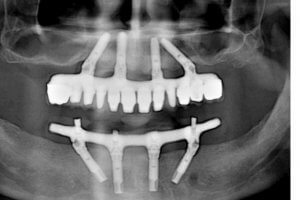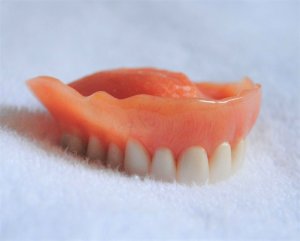If you need more than one tooth replacement, you may want to consider All-on-4 dental implants for tooth restoration. All-on-4 implants cost less than a full set of dental implants, as they require fewer implants in the jaw than traditional methods.
In this article, we’ll dive into the following information:
- All-on-4 dental implants cost
- All-on-4 dental implants near me
- Before and after all on 4 dental implants
What are All-on-4 dental implants?
All-on-4, a registered trademark of Nobel Biocare, is a technique for replacing teeth using fewer implants than traditional methods. This technique has the following three traits:
1. As few as four implants per jaw


Where a full mouth of implants using traditional methods would require 8-10 implants per jaw, the Nobel Biocare All-on-4 technique uses just four. Sometimes five or six are needed on the upper jaw due to lower bone density. For more information on multiple teeth per implant, you can read our guide to having 1 dental implant for 2 teeth.
2. Angled rear implants for optimum strength
Rather than being inserted vertically, the rear implants are at a 30-45 degree angle.
This angle reduces the need for bone augmentation and means even patients who have suffered bone loss should be eligible for All-on-4, without having to go through the costly and lengthy process of a bone graft.
3. The ability to be implanted and fitted in a day
You don’t have to wait until after the All-on-4 dental implants recovery time is over to get your new teeth. This last trait has earned them the nickname ‘teeth in a day‘, ‘smile in a day’, or ‘same day teeth’. This is a drastic improvement on traditional implant procedures which can take six months or more to complete with extensive recovery time at each step of the process.
The following animation shows how All-on-4 treatment works and how to clean All-on-4 dental implants:
This is not the only system for people who want an immediate full arch restoration. For instance, the Straumann Pro Arch system offers similar benefits. But we will use the term ‘All-on-4’ in this article, since it is the term most people use to talk about this type of teeth implant.
All-on-4 procedure pros
All-on-4 dental implants offer many benefits over conventional implants and dentures. These include:
- Short treatment and recovery time
- Implants placed on the same day as extraction
- Comfortable and stable structure to support crowns and bridges
- Fixed in place; no need to remove for cleaning
- Don’t slip or fall out
- Suitable for patients with jaw bone loss
- More affordable than traditional techniques that use 8-10 implants
All-on-4 procedure cons
Of course, All-on-4 dental implants have problems as well:
- Results may not be as good as with traditional implants
- Some people report problems with spitting or hissing while speaking
- Some dentists see it as a ‘shortcut’ to replacing teeth properly
- Not a fully customized solution
- A single implant failing can cause problems with the whole jaw
- The implant gum bridge may feel bulky in your mouth
Keep reading for more information about each of these pros and cons and how they might affect you.
All-on-4 is an excellent treatment for patients who:
- Have neglected their teeth for a long time
- Have teeth that cannot be restored
This is also a good treatment for those who are self-conscious of how their teeth look and want a better alternative to a denture.
These patients can come to the dental office with their natural, unrestorable teeth and have an All-on-4 implant treatment done in an hour or so. They will walk out with a brand new set of teeth and a fantastic smile.
This treatment’s only downfall is that the patient is getting between 4 to 6 implants in their jaw, with a fixed prosthesis on it. Oral hygiene is not as easy as getting a single implant and crown on every missing tooth.
Dr. Reshad, Sutton Place Dental Associates
All-on-4 vs. dentures
All-on-4 implants are sometimes mistakenly referred to as ‘All-on-4 dentures.’ That’s probably because the traditional way to replace a full jaw of teeth is with removable dentures, which consist of a gum-colored acrylic base and teeth made from resin or porcelain.
Dentures are removeable


Dentures fit over the gums and stay in place either with suction alone or with a dental adhesive. Properly fitting dentures shouldn’t require any adhesive.
However, the supporting bone shrinks over time as there are no teeth for it to hold in place, and this change of shape will cause dentures to become loose. This means they need to be replaced regularly to avoid discomfort and problems eating.
Removable dentures are custom-made to precisely fit the patient’s mouth. The upper denture covers the roof of the mouth and the lower one is a horseshoe shape to allow room for the tongue.
They must be removed for cleaning, usually overnight (hence the cliché of false teeth in a glass on the nightstand).
All-on-4s are fixed
In contrast, All-on-4 implants are fixed in place and should act just like natural teeth in terms of appearance, chewing, and comfort. There is no risk of them slipping out of place while the wearer is talking or eating after All-on-4 implants placement.
Although the prosthetic teeth are fixed to a synthetic gum, this covers only a small area of the real gum when compared to dentures. The join is hidden far enough behind the lips that it won’t be visible when you smile.
Dentures offer a clear cost advantage over any kind of implants but they do need to be replaced every five years on average.
There is a tooth-replacement method that exists somewhere in between standard removable dentures and All-on-4 implants, and that would be snap-in implant dentures. They normally require fewer than four implants, providing less security than All-on-4s, but more than dentures. Like dentures, they are removed at night.
Another more affordable option that is very similar to All-on-4s is G4 by Golpa implants. These can also be placed with as few as four implants, but they cost considerably less and the whole All-on-4 dental implant procedure is done within 24 hours. You can read our G4 implant article for more information.
All-on-4 vs. regular implants
The conventional way to replace a full jaw of teeth is with a combination of single-tooth implants and implant-supported dental bridges.
Bridges allow several ‘teeth’ to be supported by one implant at each end instead of one implant per tooth. This technique usually requires 8-10 implants per jaw to replace all teeth.
You can read more about how traditional implants are fitted here.
While both techniques involve drilling sockets in the jaw bone, All-on-4 requires fewer implants. This makes the process quicker, easier, and more comfortable for the patient. It can also be considerably less money because of the reduction in time and materials required.
Aside from the lower cost, a big advantage of All-on-4 is the reduced treatment time. Dentures can be affixed as soon as the implants have been placed, rather than the patient having to wait six months or more for healing as is the case with traditional implants.
Usually, temporary dentures are placed on the day of surgery and permanent ones are added a few months later. But whether you get All-on-4 or regular implants, the material will likely be either titanium or zirconia. You can find more about zirconia vs titanium implants.
The following table shows the key differences between dentures, regular implants, and All-on-4:
| | All-on-4 | Traditional implants | Dentures |
| Placement | Attached to 4-6 titanium implants in the jaw bone | Attached to 8-10 titanium implants in the jaw bone | Rest on the gums; may require adhesive |
| Eligibility | Suitable for patients with bone loss | May require a bone graft | Suitable for most patients |
| Eating | Fixed in place; act like natural teeth; few eating restrictions once healed | Fixed in place; act like natural teeth; few eating restrictions once healed | Can move when you chew; certain foods must be avoided |
| Longevity | 10+ years | 10-15 years | Will need to be replaced as the gums change shape (every 5 years on average) |
| Bone loss | Implants help maintain the bone | Implants help maintain the bone | Continued bone loss is inevitable, causing the denture to loosen |
| Coverage in the mouth | Artificial gums with minimal contact | Crowns attached directly to existing gums | Acrylic plate covers much of the gums and roof of the mouth |
| Appearance | Like natural teeth; gum join hidden behind lips | Like natural teeth; no artificial gum | Like natural teeth; loss of bone may cause face to sag over time |
| Cleaning | Cleaned like normal teeth | Cleaned like normal teeth | Must be removed for cleaning (usually overnight) |
| Cost per jaw | $12,000 – $25,000 | $20,000 – $45,000 | $300 – $8,000 depending on material |
The fitting procedure
Initial consultation
Your first step in the procedure will be a consultation with your chosen dentist. During this consultation, they will examine your mouth and do a CT scan.
This scan lets them assess your suitability for implants. They can check your existing jaw bone density to determine precisely where the implants should be inserted.
Your dentist should also discuss alternative treatment options with you, such as mini implants for those with low jaw bone density, before you commit to anything.
If you are a suitable candidate and decide to go ahead, the next step will be dental impressions. These are sent to a lab where your new dental bridge is designed to fit and look just like natural teeth.
Your dentist may also take some panoramic dental x-rays to help with planning your treatment.
Surgery
If you need to have teeth extracted before your implants are inserted, this can usually be done on the same day.
Your dentist or oral surgeon will probably offer you a sedative to help you relax during the procedure. Then they will anesthetize you so you don’t feel any pain during implants surgery.
If you would prefer to have a general anesthetic for your All-on-4 treatment, ask your dentist about this at your initial consultation.
After any remaining teeth are extracted your mouth will be thoroughly cleaned to remove any damaged tissue and bacteria.
The dentist drills two or more holes at the front of your jaw to hold the front implants. Two holes at the rear, one on each side, are angled to offer greater support to the rear of the bridge.
Once the implants are placed, your mouth is cleaned again and any incisions are stitched up. It’s common for dentists to use dissolvable stitches which disappear after a week or two.
Either the same day or the following day you’ll be fitted with your new teeth. Some dentists create a temporary overdenture at this stage which is then replaced a few months later.
This is often made from resin, a lighter but less durable material, which puts less pressure on your All-on-4 implants while they heal.
Aftercare
Patients usually experience some bruising, swelling and general discomfort in the days after their surgery. You’ll probably want to take a couple of days off work to recover fully and get used to your new teeth.


Your dentist will advise you on the type of foods you can and cannot eat in the months after your treatment.
For the first few months, you’ll probably have to stick to very soft foods so you don’t disturb the process of the implants fusing with your bone. You might also be advised to avoid things like smoking and heavy exercise for a while.
These implants are cleaned just like your normal teeth, by brushing twice a day. Your dentist will also show you how to floss with special tools.
You might want to invest in a water flosser with special attachments designed to clean around implants. You can read all about the best water flossers available.
Find out more about how to clean All-on-4 dental implants.
Final checks and fitting
6-9 months after surgery, your implants should be ready to support a permanent overdenture. This is usually made from porcelain or some other durable and high-quality material.
If you look after your new teeth carefully, they should last for 20 years or longer.
You’ll need to return to your dentist for regular checkups and maintenance. Check whether these visits are included in your treatment cost or whether you’ll have to pay for them separately.
Before and after All-on-4
If you are getting all-on-4 treatment, chances are that you don’t have a mouth full of bright white shining teeth. That means that the all-on-4 before and after transformation can be quite drastic. Have a look at the video below where a man who got his teeth replaced marvels at the difference.
Where can I get All-on-4 dental implants near me?
Look for an implantologist who specializes in All-on-4 treatment. Make sure they have some experience with this type of implant since not all dentists use the same systems.
You can find an All-on-4 dentist the same way you would find any dentist, by using an online or hardcopy directory. You should also ask your own dentist if they offer All-on-4 implants, or if they can recommend anyone to you.
Alternatively, you can call 866-383-0748 to talk to an All-on-4 dentist near you. There are dentists ready to take your call, 24/7, relating to any service you need, including All-on-4 implants.
Once you find your All-on-4 dentist, they will discuss your treatment plan at your initial consultation. Remember, if you’re not a suitable candidate for All-on-4 they will recommend an alternative treatment.
Many Americans travel to Central America or other destinations to take advantage of more affordable dental work. If you live near the Mexico border this can be very convenient and extremely cost-effective. Find out more about US dental tourism here.
How much do All-on-4 dental implants cost near me?


All-on-4 implants cost between $12,000 to $25,000 per jaw in the US. This depends on the number of implants you need and the material you choose for your permanent All-on-4 dentures.
Even though the All-on-4 cost is less than a full mouth of separate implants would be, it’s still a hefty price tag that many of us would struggle to finance.
Thankfully, there are ways to help with the costs of All-on-4s, some of the most helpful of which — dental insurance, dental savings plans, dental loans, and going abroad for dental work — are highlighted in the table below:
As with any dental work, it’s a good idea to shop around and get quotes from several All-on-4 clinics in your area. However, you shouldn’t get implants based on price alone. Read our guide to find the cheapest place to get All-on-4 dental implants.
It’s more important to find a trained professional who has experience carrying out the procedure you require.
You can find out about other ways to save money on cheap dental implants, sinus lifts, or ways to finance your dental work in our separate guides.
A dental insurance plan may cover part of your treatment costs. We know that dental insurance can be expensive and it can also be difficult to know which plan to choose.
But we are here for you — we’ve created a special comparison tool that shows you the top plans in your area to help guide you in your decision.
It takes just a few seconds to fill in your DOB and zip code, and you’ll see full coverage plans that cover your needs. Get started with the form below!


All-on-4 dental implants reviews and studies
You might be wondering “Are All-on-4 dental implants safe?” or “How long do all-on-4 implants last?” As this is a relatively new technology, existing studies have only looked as far as the 10-year survival rate.
The results are promising, with 99.2% of prostheses lasting longer than 10 years. Other research shows that the survival rates for this treatment are between 92.2% and 100%.
Another study looked at the Straumann Pro Arch concept and found a 97.7% success rate after 55 months. Those implants that did fail were able to be replaced, and the overall prosthesis survival rate was 100%.
There is every reason to believe that these implants can last 15 to 20 years or longer, provided you follow your dentist’s instructions for taking care of them.
There are plenty of All-on-4 before and after photos and videos to be found online. Here you can see one patient’s heartwarming All-on-4 dental implants review, and see the results of All-on-4 before and after treatment:
Possible All-on-4 dental implants problems
As we mentioned before, every patient is different. In order to determine the best treatment plan, a dentist must have a broad understanding of each patient’s unique circumstances, including factors that might have implications for certain treatments.
Before undergoing All-on-4 treatment, the patient should understand possible complications and discuss any concerns with their dentist. Some common All-on-4 problems include:
- Parafunction: Habits such as teeth grinding, clenching, and irregular chewing may influence treatment decisions. When all natural teeth are replaced, natural teeth sensation reduces and patients are less aware when their teeth are under pressure. In patients where parafunctions are present, a bar-supported overdenture may be preferable.
- Speech issues: It can take some time to adapt to having a bulky new prosthesis in the mouth. Most patients can retrain their speech after a few weeks but for some the problem may linger.
- Infection: Even when no natural teeth remain, food can get stuck underneath the denture and cause infection and gum disease. Therefore, patients must follow a stringent cleaning routine.
- Implant failure: Any type of implant can fail for various reasons, including poor management of systemic diseases like diabetes. Good oral hygiene and proper aftercare help minimize the risk, so follow your dentist’s instructions carefully.
– Dr Eyad Tariq
Conclusion
If you need to replace one or more teeth, for health or esthetic reasons, you may be interested in All-on-4 dental implants.
This type of dental implant is an innovative way to replace more teeth with fewer implants. And they are less expensive than a full set of separate teeth implants.
Chances are, there’s a dentist who offers all-on-4 treatment in your area. You can find one now by dialing 866-383-0748
And if you still have questions, you might find a teledentistry, or an online dentist appointment to be helpful.
FAQs
All-on-4 dental implants cost between $12,000 to $25,000 per jaw on average. This makes All-on-4 dental implant considerably less than the $40,000 it costs for a full set of traditional implants.
All-on-4 implants are made to last at least 20 years, and potentially a lifetime with proper care. This makes the average cost of All-on-4 implants worth it for many people.
All-on-4 dental implants are a way to replace multiple missing teeth with fewer actual implants. This type of implant is more affordable and faster than traditional individual implants.
The best way to find an All-on-4 dentist near you is to simply ask your dentist if they perform the procedure, and if not, if they could refer you to someone who does.
You can also call 866-383-0748 to be connected with a dentist 24/7, so you can meet with an All-on-4 specialist near you ASAP.
NCBI: A longitudinal study of the survival of All-on-4 implants in the mandible with up to 10 years of follow-up. Consulted 22 August, 2019.
NCBI: The Evolution of Dental Materials for Hybrid Prosthesis. Consulted 22 August, 2019.
DentistryIQ: When is All-on-4 the best option? 5 factors to consider when creating your dental treatment plan. Consulted 30 November 2020.
Journal of Clinical and Diagnostic Research: Prosthodontic Perspective to All-On-4® Concept for Dental Implants. Consulted 30 November 2020.
Journal of Clinical and Experimental Dentistry: The all-on-four treatment concept: Systematic review. Consulted 30 November 2020.
Lupinepublishers.com: All-On-Four Treatment Concept in Dental Implants: A Review Articles. Consulted 23rd December 2020.
International Journal of Implant Dentistry: A fixed reconstruction of fully edentulous patients with immediate function using an apically tapered implant design: a retrospective clinical study. Consulted 11th January 2021.
NCBI: A longitudinal study of the survival of All-on-4 implants in the mandible with up to 10 years of follow-up. Consulted 22 August, 2019.
NCBI: The Evolution of Dental Materials for Hybrid Prosthesis. Consulted 22 August, 2019.
DentistryIQ: When is All-on-4 the best option? 5 factors to consider when creating your dental treatment plan. Consulted 30 November 2020.
Journal of Clinical and Diagnostic Research: Prosthodontic Perspective to All-On-4® Concept for Dental Implants. Consulted 30 November 2020.
Journal of Clinical and Experimental Dentistry: The all-on-four treatment concept: Systematic review. Consulted 30 November 2020.
Lupinepublishers.com: All-On-Four Treatment Concept in Dental Implants: A Review Articles. Consulted 23rd December 2020.
International Journal of Implant Dentistry: A fixed reconstruction of fully edentulous patients with immediate function using an apically tapered implant design: a retrospective clinical study. Consulted 11th January 2021.




